| This blog explores social attitudes in Jane Austen's time, discusses her novels, reviews forgotten 18th century novels, and throws some occasional shade at the modern academy. The introductory post is here. My "six simple questions for academics" post is here. This book review for The Banker's Daughters of Bristol (1824) contains spoilers. |
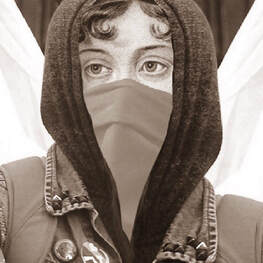 More radical than Austen
More radical than Austen But most of the novel has nothing to do with Jane and Maria Milsom, the titular characters. The central heroines, representing Compliance and Decision, are Louisa Gordon and Fanny Woodville. Louisa lives in a rustic cottage with her genteel but impoverished mother, and Fanny is the orphaned daughter of a star-crossed love match.
The Banker’s Daughters of Bristol is a strange mixture of hackneyed prose ("pellucid waters," “woo danger in the tented field”) and conventional morality punctuated with strong editorial outbursts. The narrator and some of the characters randomly exclaim against the government, the church, the army, and British society at large. That surprised me, since the novel is a product of the Minerva Press, printers of popular romance and gothic horrors for the reading public.
I wonder, did the publisher even notice these little protest speeches? Maybe he just gave the manuscript a brief glance--
- young man from good family is friendly with a poor family who have a beautiful young daughter whom he is forbidden to marry, check,
- brother kidnapped by Algerine pirates, check,
- another young man from good family is friendly with a poor family who have a beautiful young daughter whom he is forbidden to marry, uh... okay, check,
- dissolute old nobleman tries to force heroine into mercenary marriage, check,
- long-lost brother shows up under an assumed name but drops some exceedingly broad hints that he's not who he claims to be, check,
- hero returns from the dead, check,
And another strange thing about this story: we open Volume I with “Lady Waldegrave” and her bratty little boy, then, without explanation, we turn to a completely different cast of characters. Not even a dividing line--
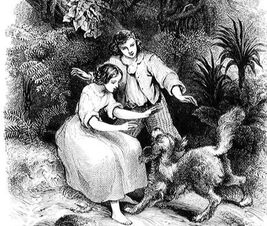 Growing up with the poor but lovely girl next door -- what could possibly go wrong?
Growing up with the poor but lovely girl next door -- what could possibly go wrong? But back to the editorial opinions. Here's an example: Fanny Woodville's father rejects the army and the church as a profession when he is looking for a way to support his wife after his dad cuts him off. “[H]e shuddered at the idea of sacrificing the right of private judgment, of becoming a part of a destructive machine, which, at the will of a junta, or the nod of a monarch, might be set in motion to crush the rising spirit of liberty amongst an oppressed people; nay, even perchance to shed the blood of his fellow-citizens when in the act of asserting the sacred rights of freemen, in opposition to the will of a corrupt and powerful faction—” Here we have an overt reference to the fact that the militia or the army was sometimes used domestically to crush popular uprisings.
As for the church, “To many of the doctrines of the church as original sin, the predestination of unborn millions to everlasting torments, etc. as being wholly repugnant to the divine attributes of justice and mercy, claimed not the assent of his reason: and to receive in any shape the wages of hypocrisy, was a debasement from which his honourable mind revolted with horror.” Later, the author gets sarcastic about the Trinity and the Thirty-Nine Articles. So a female author, a decade after Austen, openly deriding Christian doctrine in the equivalent of a mass-market paperback. Okey-dokey.
Later in the tale, Arthur Osborne, Louisa's love interest, impetuously joins the army after his dad refuses their marriage. Louisa weeps and wanders around the meadows and “mentally ejaculate[s]:” “Alas! No station, however exalted or however humble, can exempt human beings from the varied forms of sufferings to which their common nature is liable; why, oh why then, does the absurd institutions of society, and the evil passions of men, augment these sufferings in a tenfold degree?”
| "Satire on Lord Mansfield (yes, that Lord Mansfield) and his judgements allegedly undermining British liberty." | Louisa, therefore, goes through several incarnations, as a sweet-natured country girl in volume 1, an angry radical in volume 2, and a vapid married woman in volume 3. She's also a painter of professional caliber in volume 2, although it's never mentioned again. Here’s some of radical Louisa’s thoughts, as she tours a stately home and contemplates the portraits and family trees on the walls. You' would think she's about to get a nose ring and dye her hair blue: “Here flourished a warrior… whose fiat perhaps let loose bands of legalized plunderers to sack and pillage peaceful cities, and put their inhabitants to the sword, to convert luxuriant fields into barren wastes, to spare neither smiling infancy nor decrepit old age, merely because they inhabited a geographical point in the globe, where credulity reached not to the same point in respect to some incomprehensible matter of faith as in the land of their invaders.” “There, on the next branch, is recorded the name of an ermined judge, whose office gave him the enviable power of protecting the weak, punishing the oppressor, and extending equal justice to all; yet, for aught we know, he might be a perverter of judgment to please a royal master, or a corrupt court faction, a false expounder of the laws, the scourge, not the protector of the people.” |
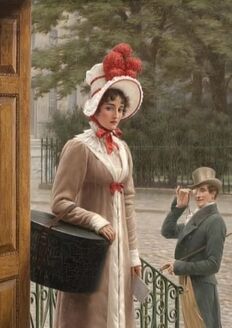 Delivering the New Hat (detail), by Edmund Blair Leighton
Delivering the New Hat (detail), by Edmund Blair Leighton Given the prevailing emphasis on slavery and empire in literary academia, I always mention any references in the novels I'm exploring. In The Banker's Daughters, one young man is kidnapped by Algerine pirates and is enslaved in North Africa for several years, where he assists and befriends a kidnapped Spanish grandee and his beautiful daughter (as one does). (If you're unfamiliar with the history of enslaved Europeans, click here for an article about the Barbary pirates).
Volume 2 introduces the spinster “daughter of an obscure Indian adventurer,” aka “Sir Thomas Gourland, the rich old nabob…” with an immense East Indian fortune. People who lived in tropical climates and then came to England were often portrayed as being sickly or indolent, like Miss Lambe in Sanditon, "chilly and tender." The Gourlands are unhealthy and wrinkled as raisins. Like all nabobs, they flaunt their wealth: “The deep orange lining of the carriage, and the flame-coloured India shawl in which her person was wrapped, gave a cadaverous hue to her naturally dingy complexion." This heiress is married off to old Lord Woodville, grandfather to Fanny Woodville, the plucky heroine who displays a decisive character.
Although Fanny, orphaned and neglected, has been snatched from toiling as a milliner’s assistant and placed in a lavish mansion in London, she doesn’t develop warm feelings for her paternal relatives. Fanny regards her step-grandmother as: “the shriveled being who sat enshrouded in all the self-consequence of wealth and rank," [whereas Fanny] "inwardly reprobates the absurd institutions of society, which so strongly tend to exalt the mere accidental distinction of birth, or the possession of property, over intellectual attainments or moral worth.”
Fanny's grandfather sits in the House of Lords, and our authoress is scathing about his doings: “the peer rose and retired to his dressing-room, to prepare to attend the council, in order to persuade his colleagues that it was for the interest and the glory of Britain to squander away her blood and treasure in a contest about a barren nook of earth, and the right to trade in the furs of certain species of wild animals.”
This might be a reference to the Franklin Coppermine Expedition of 1819, but I’m not certain. Here’s what she has to say about the American Revolution and the War of 1812:
“The faithful pen of history will record [Lord Woodville's] name as one of that insensate band, whose pernicious counsels dismembered Britain of her fairest provinces, squandered away her best blood and treasure in a parricidal war against the independence of America, mainly assisted, by his borough interest, to corrupt the purity of legislation, and forge burdens for posterity [I presume she means taxes] which at some future period must either terminate in slavery or revolution.”
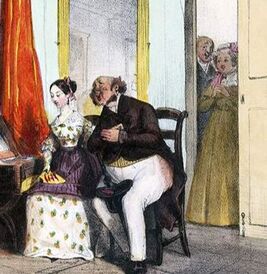 Up with this sort of thing Fanny will not put
Up with this sort of thing Fanny will not put None of this has anything to do with the domestic drama. Lord Woodville might be about to drive the common people of Britain to “slavery or revolution,” but in his spare time he tries to force Fanny into marriage with the dissolute Lord Beauchamp. She firmly resists:
“I should be sorry, my lord, to give so near a relative any just cause of provocation; but if the continuance of your protection can only be secured by a sacrifice of principle and happiness, I must even make up my mind to resign your short-lived favour, and seek independence by the exertion of my talents.”
Lord Beauchamp is incensed at her refusal. “Go, proud beauty!” muttered the peer between his teeth; “a time may come when I shall make you repent this insolence.”
Actually, that time never comes. Fanny attends a masquerade ball and she is not even abducted. I think our author is what we today call a “pantser,” not a “plotter.” She’s making it up as she goes along. Characters appear and disappear and story lines start and peter out. As I mentioned, Louisa’s radical sentiments aren't congruent with someone who is supposed to represent compliance. Her mother, Mrs. Gordon is unfailingly kind, patient, and principled in the opening volume, but by the end of the book Fanny blames Louisa’s over-compliant nature on the “absurd education” she got from her mother, and Mom's patriotism and loyalty to the army are presented as ridiculous notions that only bring misery on the credulous women who offer up their husbands and sons for slaughter. The East Indian nabob’s daughter becomes a kind and considerate woman. “The native kindness and generosity of Lady Woodville’s disposition had been stifled and perverted by the early and inordinate indulgence in the luxury and effeminacy of the east. The love of rank and title were from infancy held up to her view by a weak and ignorant father, as objects of idolatry, yet when attained, she found them powerless to confer happiness…”
To wrap up, Louisa pines herself into a decline worrying about her sweetheart Arthur, sent off to fight in India. The family receives word that he's dead, but I for one never believed that for a moment. She ends up marrying Sir Marmaduke Waldegrave, a fellow who shows up in volume 3. He's a fairly decent chap but their marriage subsides into indifference. She becomes the indulgent mother of a spoilt little brat whose misbehavior leads to his death through an accident. She is the Lady Waldegrave who we meet in the opening pages of the novel.
After it's too late, Arthur Osborne reappears to discover the girl he loved is married. He's nursed back to health by Fanny, and he falls in love with her. Two other minor female characters also make happy love matches. The oldest banker's daughter, who tricked old Mr. Osborne into marrying her, runs off with an Italian opera singer once she's widowed, leaving her two young sons to be raised by Arthur and Fanny.
The Banker’s Daughter received one review, from The Literary Chronicle in November 1823, and it was brief but favourable. “The object of the novel… is to contrast the good effects of decision and firmness of character, with a weak compliance with bad advice, as exemplified in two characters. The moral is good, and the style of the novel, though not elegant, is generally correct.” Reviewers always kept an eye on morality in those days, and yet this reviewer either did not notice or was not concerned that the "fair author" threw in some anti-church speeches.
I've been pretty harsh about this novel, as a novel, but there is a whole other story here concerning the author, "Rosalia St. Clair" (of course this is a pseudonym). Her story deserves to be remembered and she was actually a woman ahead of her time who accomplished a great deal under miserable circumstances. Next post....
| Another thing that betrays the vulgarity of the banker’s daughters is that they gossip with their ladies’ maid. "But dear me,” [Maria sighs] "now I should like to have Nancy Wilmot back again! She was so good at telling all the news, and so funny, that I used almost to split my sides with laughing at her.” More on servants in 18th-century literature and in Austen's novels, here. Another forgotten female novelist who was quite outspoken was Ann Ryley (1760-1823). My series about her starts here. |
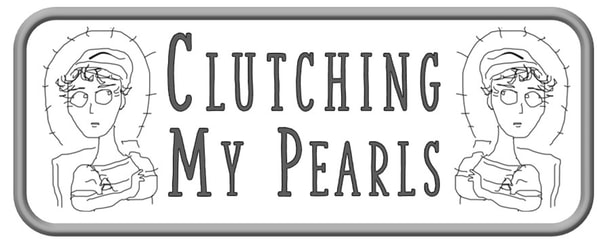
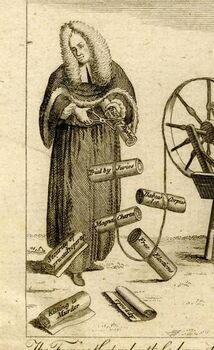
 RSS Feed
RSS Feed